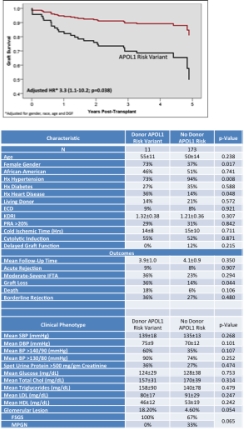Donor Apolipoprotein L1 Genotype Associates With Glomerular Lesions and Graft Loss in Kidney Transplants
Medical University of South Carolina, Charleston, SC.
Meeting: 2015 American Transplant Congress
Abstract number: B263
Keywords: Gene polymorphism, Genomics, Glomerulonephritis
Session Information
Session Name: Poster Session B: Translational Genetics and Proteomics in Transplantation
Session Type: Poster Session
Date: Sunday, May 3, 2015
Session Time: 5:30pm-6:30pm
 Presentation Time: 5:30pm-6:30pm
Presentation Time: 5:30pm-6:30pm
Location: Exhibit Hall E
Introduction/Aims: Previous studies have associated donor apolipoproteinL1 (APOL1) risk genotypes with risk of graft loss among kidney transplants. APOL1 risk genotypes have also been associated with focal segmental glomerulosclerosis lesions (FSGS) and/or progression in several renal diseases. We hypothesized that donor APOL1 risk genotype is associated with a more aggressive clinical phenotype (blood pressure (BP), Graft loss, Proteinuria) and a higher prevalence of FSGS lesions on biopsy among kidney transplants.
Methods: Secondary analysis of a RCT induction trial (rATG vs. IL-2RA), with long-term clinical follow up and gene variant analyses. Gene variants for APOL1 (G1 & G2)) were analyzed in the donor using the Sequenom Mass ARRAY iPLEX platform. We examined the association between donor APOL1 genotype, clinical course and graft biopsy lesions in a multivariate model.
Results: Of 200 patients in the original RCT, gene variant analysis was available in 166 donors. Recipients of APOL1 risk genotype kidneys were more likely to be female, have a history of heart disease and tended to have higher post-transplant blood pressure (BP). The risk of graft loss was significantly higher among recipients of APOL1 riks genotype kidneys (Adjusted HR 3.3(95 % CI: 1.1-10.2); p=.038) figure, table.
Glomerular lesions were significantly more frequent in biopsies of risk genotype kidneys (18.2 %, risk vs. 4.6 % Non risk, p=0.054). Of those with glomerular lesions, the FSGS lesion was noted in 100% of risk genotype kidney biopsies vs. 67% (p=0.065) of non-risk kidneys figure, table.
Conclusions: Donor APOL1 genotype associates with a more aggressive clinical phenotype and increased risk of graft loss. Donor APOL1 risk genotype is associated with glomerular lesions, specifically an FSGS pattern of injury in graft biopsies. We postulate that donor APOL1 risk genotype may polarize toward a glomerular pattern of allograft injury and mediate progression to graft loss among kidney transplants. These findings merit further study in a larger population.
To cite this abstract in AMA style:
Srinivas T, Baliga P, Chavin K, Gebrezhiaber M, Egede L, Taber D. Donor Apolipoprotein L1 Genotype Associates With Glomerular Lesions and Graft Loss in Kidney Transplants [abstract]. Am J Transplant. 2015; 15 (suppl 3). https://atcmeetingabstracts.com/abstract/donor-apolipoprotein-l1-genotype-associates-with-glomerular-lesions-and-graft-loss-in-kidney-transplants/. Accessed March 5, 2026.« Back to 2015 American Transplant Congress
